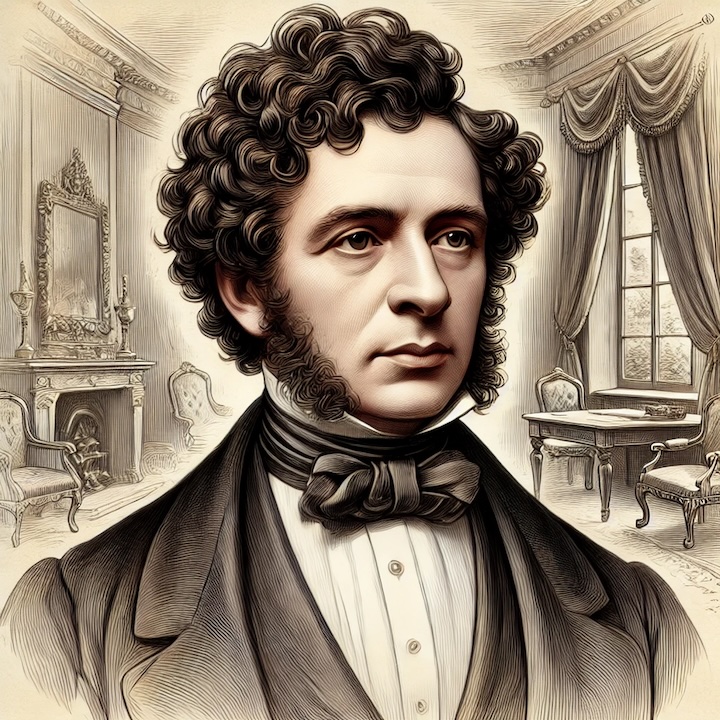
Benjamin Disraeli (1804-1881) was a British statesman and novelist who became the first Jewish-born Prime Minister of the United Kingdom. A leader of the Conservative Party, Disraeli championed “One-Nation Conservatism,” seeking to unite the rich and poor. His political career included key reforms to improve living conditions and significant contributions to the expansion of the British Empire, such as securing control of the Suez Canal. Disraeli’s legacy endures as a pivotal figure in British history.
Benjamin Disraeli, born on December 21, 1804, in London, was one of the most influential and charismatic figures in British political history. He was not only a statesman but also a novelist, and he became the first and only Jewish-born Prime Minister of the United Kingdom. Disraeli's political career was marked by his leadership of the Conservative Party, his rivalry with William Gladstone, and his significant contributions to the expansion of the British Empire.
Disraeli was born into a Jewish family, though his father, Isaac D'Israeli, had Benjamin baptized into the Church of England when he was 12 years old, which allowed him to pursue a political career in an era when Jews were barred from Parliament. Despite this conversion, Disraeli remained proud of his Jewish heritage throughout his life, often using it to his advantage in his political writings and speeches.
He initially pursued a career in law but soon turned to literature, writing several novels that garnered him attention. His most famous novels include "Vivian Grey" (1826) and "Sybil" (1845), which reflected his concerns about the social issues of the day, particularly the divide between the rich and the poor in England. These works helped establish Disraeli's reputation as a writer and thinker, and they also served as a platform for his political ideas.
Disraeli entered politics in 1837 as a Member of Parliament for the constituency of Maidstone, representing the Conservative Party. However, his early political career was not smooth. He struggled to gain acceptance within the party, largely due to his outsider status as a man of Jewish descent and his flamboyant personality, which clashed with the more reserved members of the Conservative establishment. His early speeches in Parliament were poorly received, and he famously remarked after one such speech, "I am not surprised at my defeat, but I am surprised at the cause."
Despite these initial setbacks, Disraeli's perseverance paid off. He gradually built a following within the Conservative Party and began to develop his political philosophy. He was a staunch supporter of the monarchy and the British Empire, and he believed in a form of conservatism that sought to protect traditional institutions while also addressing the social issues facing the working classes. This philosophy came to be known as "One-Nation Conservatism," which advocated for the unity of the rich and poor in a single nation.
Disraeli's political fortunes changed dramatically in 1852 when he was appointed Chancellor of the Exchequer under Lord Derby's short-lived Conservative government. Although that government fell, Disraeli's role as Chancellor marked the beginning of his rise to power within the Conservative Party. He became the leader of the Conservatives in the House of Commons in 1858 and, in 1868, he became Prime Minister for the first time, though his first term lasted only a few months.
Disraeli's most significant period as Prime Minister came during his second term from 1874 to 1880. During this time, he implemented several important reforms, including the Public Health Act and the Artisans' and Labourers' Dwellings Improvement Act, both of which aimed to improve living conditions for the working classes. He also played a key role in the expansion of the British Empire, securing control of the Suez Canal and proclaiming Queen Victoria as Empress of India, thereby solidifying Britain's imperial power.
Disraeli's political career was marked by his rivalry with Liberal leader William Gladstone, with whom he had numerous ideological clashes. While Gladstone focused on domestic reforms and moralistic policies, Disraeli emphasized imperial expansion and pragmatic governance.
Benjamin Disraeli passed away on April 19, 1881. His legacy endures not only as a political leader who shaped the course of British history but also as a cultural figure who bridged the worlds of literature and politics. His vision of a united nation and a powerful empire left an indelible mark on Britain and the world.
 >
>